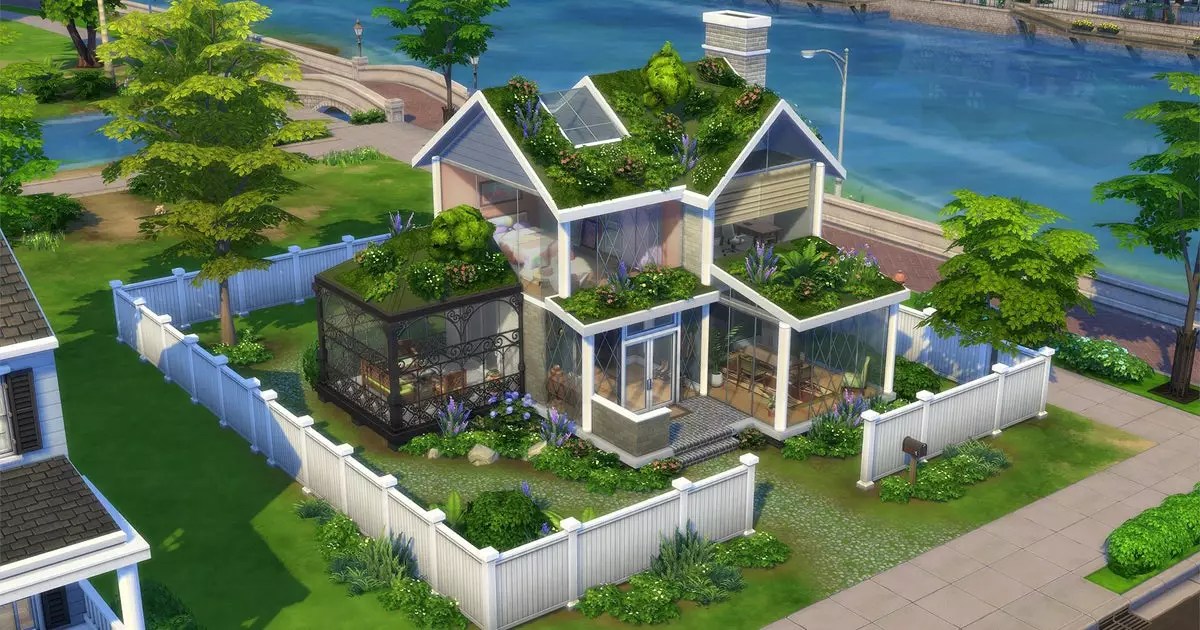The latest update for The Sims 4 signifies a pivotal shift in how players interact with their digital worlds. While innovations such as glass walls and rooftop gardens might initially seem like creative novelties, they reveal a deeper, more troubling trend: the erosion of the game’s boundary between playful simulation and disturbing surveillance. Historically, The Sims allowed a degree of privacy for its virtual inhabitants, granting players the sense that their digital creations enjoyed a degree of autonomy. However, the introduction of transparent walls fundamentally undermines this illusion, turning formerly sheltered lives into open displays for voyeuristic entertainment.
This shift reflects a disturbing trend toward spectacle and manipulation. By enabling the creation of “glass prisons” and otherwise exposed living spaces, EA and Maxis essentially throw open the doors to a disturbing form of digital cruelty. When virtual residents can be observed without privacy, the line between benign sandbox play and exploitative voyeurism becomes blurred. The game, which once offered a miniature utopia, now edges closer to a dystopian arena where the inhabitants’ suffering can be infinitely prolonged for the amusement of the player — or worse, for aesthetic experimentation. This erosion of boundaries raises pressing questions about the responsibilities of developers in safeguarding the psychological health of their user base, even within a virtual environment.
The Illusion of Innovation Versus Ethical Responsibility
The addition of rooftop plants and transparent walls might be framed as a fun, creative upgrade, but it masks a more troublesome reality. It reveals how game design can inadvertently, or perhaps deliberately, normalize intrusive behavior. Planting flora on rooftops, as described in the update, seems innocuous, yet it invites a disturbing mental image: what happens when such features are weaponized as voyeuristic tools? The game’s mechanics now make it easier than ever to construct spaces where privacy is a thing of the past, pushing players toward scenarios that may border on the morally questionable.
EA’s communication about these features, including the mention of a forthcoming fairy-themed expansion, suggests a strategic commercial focus, but it omits a crucial ethical discussion. Do these updates encourage players to consider the implications of their actions? Or do they simply serve as a blank canvas for misconduct? The heavy-handed embrace of transparency forgets the importance of respecting the virtual agency of Sims as characters that, while not real, act as metaphors for real human feelings and rights. As the boundaries of privacy are tested and stretched, the question emerges: are we witnessing the desensitization of players to invasive behavior?
Reflection on Player Creativity and Play Ethics
The community’s response to these updates demonstrates both innovation and potential destructiveness. Players are using the new glass walls to craft spaces that serve specific narratives—ranging from idyllic greenhouses to overtly oppressive confinement cells. Such creations reflect an inherent human tendency to push boundaries and explore limits, but they also reveal the darker side of unfettered creativity in virtual space.
It’s crucial to recognize that the freedom to build and experiment comes with moral choices. The temptation to manipulate virtual characters’ lives for entertainment can easily slide into cruelty if unchecked. When players design “glass cages” or force their sims into uncomfortable situations, it highlights an uncomfortable truth: virtual spaces mirror social ethics, or the lack thereof. The ease with which these features can facilitate morally questionable scenarios warrants a serious discourse about the responsibilities of players and developers alike.
Moreover, the introduction of new inventory systems and menu simplifications demonstrates a desire for streamlining gameplay, yet it inadvertently facilitates more manipulative or careless interactions with the game’s mechanics. As interfaces become more user-friendly, so too does the ease of designing potentially harmful scenarios. It raises the question: are these updates making the game more inviting for harmless creativity, or are they unintentionally cultivating an environment where unethical treatment of virtual beings becomes normalized?
Beyond Play: A Reflection on Virtual Humanity
The evolving landscape of The Sims 4 challenges us to consider the broader implications of virtual life simulation. While playful antics, such as rooftop gardens or transparent walls, can be fun, they also serve as mirrors to societal values and boundaries. When developers prioritize novelty over ethical considerations, they risk turning a charming simulation into a tool that fosters desensitization and dehumanization—even if only in a virtual context.
In the end, the game’s mechanics reflect more than just player creativity; they expose our collective attitudes toward privacy, autonomy, and suffering. As much as The Sims 4 is a form of escapism, it is also a platform for moral reflection. Are we programming empathy or indifference? Will future updates continue to chip away at the boundary between entertainment and exploitation? These are questions that extend beyond gaming—they touch on our evolving understanding of human dignity, even within the pixelated confines of a virtual universe.


Leave a Reply